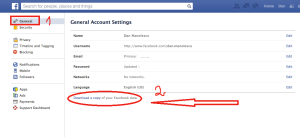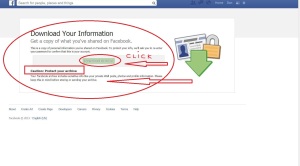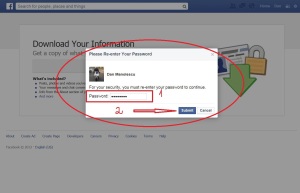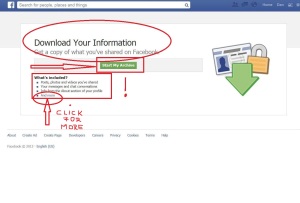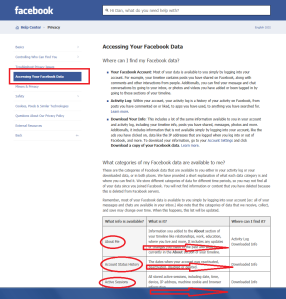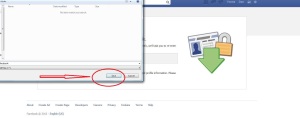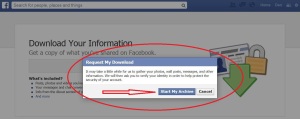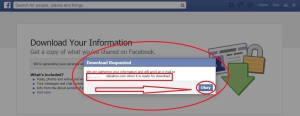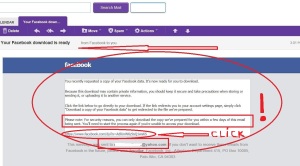Archive
Infographic-Privacy and Security on Facebook
Today, E-Crime Expert has Naomi Paton as guest blogger. She is a passionate writer and loves to write articles related to internet, teen & amp; crime. She writes for Best Computer Science Schools.
The majority of today’s populace uses the internet and social media on a regular basis, but at what cost? Although there has been some research conducted representing the negative effects of internet addiction, less is known about how young adults are being affected by misuse of facebook like bulling, reputation damage, burglary etc.
Bellow is the infographic, created by Naomi Paton, which listed the researched data and the do and don’t facts on Facebook.

Source: BestComputerScienceSchools.net
To view the original Post click here.
Any questions can be submitted to: dan@e-crimeexpert.com
Additional information can be found at: http://www.e-crimeexppert.com
To find out more about Dan Manolescu, visit his LinkedIn page here.
Hit the “subscribe” button in order to be notified when new videos and Articles are posted on this blog
Important security settings on Facebook
Information security is important. Remember that: Without security there is no privacy!Today, E-Crime Expert presents several security measures Facebook has in place for securing your private data and account.
1. Change your password (Frequently)
i. Log on your Facebook Account, go to (click) “Settings” (1)and then click on “Account settings” (2) from the fold down menu(Fig.1).
Fig. 1
ii. Go to and select the “General Settings” menu on the left and then click on the “Edit” tab from the Password field (on the right side of the page). See Fig.2.
Fig. 2
iii. Now, you have to follow the three steps bellow:
-type your current password (for security reasons);
-type your new password (check this blog post here on how to have a strong password);
-type your new password again.
Click “Change password” and your password will be changed. (Fig.3).
Fig.3.
iv. In order to be sure your password is effectively changed on all your devices, select the “Log me out of other devices” box, click on the “Submit” button from the displayed message that appears after you changed your password. That will enable you to sign out from all the devices you are automaticaley logged on. In this way, once you use them again, you will be prompted to type your new password. This is an extra security measure which enables you to protect your information if one of your devices got lost or stollen or when it is shared with other people (Fig. 4).
Fig. 4.
2. Check your active sessions
i. You can also check from where you logged on your account lately.
Click on the “Security settings” tab (see pictures above for how to get there) on the left and then go to the right-bottom of the page and select “Edit” from the “Active sessions” menu (Fig.5)
Fig.5
ii. Now, you can check from where you are logged on during the current session (top of the page) and also, you can check bellow from where you were logged on in your previous sessions.
*Note: if you notice that you appeared logged on from countries you never been or you have not been lately or from devices you do not use that means someone else logged on your account without authorization (Fig.6).
**If you notice any unfamiliar devices or locations, click ‘End Activity’ to end the session and automatically log out someone who’s using your account fraudulently.
Change your password immediately as explained under section 1 of this Blog post!
Fig.6
3. Secure browsing.
i. Go to “Security settings“, as explained above, find the “Login Notifications” menu and click “Edit“. (Fig.7)
Fig.7
ii. Then you can select either “Email” or “Text message“. Or you can always select both! Click “Save changes“.
This will enable you to be notified via email or text message when your Facebook account is accessed from a device that you do not recognize (Fig.8).
Fig.8
iii. Furthermore, you could set up a Log in approval used when login into your account from unknown devices.
Go to “Security settings” (see above) and from there to “Login approvals” (bellow to “Login Notifications”). Click “Edit” and then select the box that reads: “Require a security code to access my account from unknown browsers“. Don’t forget to click “Save changes“. Now you are set for receiving notifications or be prompted a code (that will be delivered via your email or text message as a one-time token) before logging into your Facebook account, from unknown devices (Fig.9).
In order to learn what an unknown or unrecognized device means, keep reading this post bellow.
Fig.9
4. Recognized devices.
You can always set up the devices of your choice when using Facebook.
Go to “Security Settings” (as explained above), click “Edit” on the “Recognized Devices” menu and see which your recognized devices are. Devices will be assigned to your account as recognized when you will first time log on your Facebook account (using a new password) from a certain device (You will be prompted with a message whether you would like to save a certain devices as a recognized device or not). Be careful; do not select as a “Recognized Devices” a computer from school, work, public library or hotel. For this reason and in order to check which are your recognized devices check that menu and see if the devices listed there are the one you trust. If not, you just simply click “Remove” on the right side of a particular device (for example when there is listed a device you used once in a library).
Don’t forget to click “Save changes” as usually (Fig.10).
Fig.10
5. Trusted friends
i. To get set up, visit your “Security Settings” (as explained above), where you can select three to five friends to be your trusted contacts.
Find “Trusted contacts” and click on “Edit” and then on “Chose trusted contacts“(Fig. 11).
Fig.11
ii. Type the names of 3-5 of your trusted friends. You can select them one by one.
Don’t forget to click “Confirm” (Fig.12).
To select good trusted contacts:
– Choose people you trust, like friends you’d give a spare key to your house.
– Choose people you can reach without using Facebook, ideally over the phone or in person, since you’ll need to contact them when you can’t log in.
– Choose more people to help you. The more friends you choose, the more people who can help you when you need it.
Fig.12
iii. As a security measures you’ll be prompted to introduce your account password (even if you are already logged on). Click “Submit” after you are done ( Fig. 13).
Fig. 13
iv. Immediately after, your trusted friends will appear under “Trusted Contacts“. You can now use them all, remove one or all if not pleased with your choice (Fig.14).
Fig.14
v. In order to make sure you are the one who made the selection of your trusted friends, Facebook sends you a message (check your mailbox linked to your Facebook account) confirming you added trusted friends (Fig.15).
If you did not do it, then someone most likely hacked into your account. Change your password immediately!
Fig.15
vi. Using Trusted Contacts
Once you’ve set up your trusted contacts, if you ever have trouble logging in, you’ll have your trusted contacts as an option to help. You just need to call your trusted contacts and let them know you need their help to regain access to your account. Each of them can get a security code for you with instructions on how to help you. Once you get three security codes from your trusted contacts, you can enter them into Facebook to recover your account.
With trusted contacts, there’s no need to worry about remembering the answer to your security question or filling out long web forms to prove who you are. You can recover your account with help from your friends.
***Note: If you have set up your secure browsing, login notifications and chose your recognized devices and you receive an email from Facebook notifying you that someone tried to log on your account on X day from Y location using Z device (and none of those are related to you), then Change your password immediately (as explained under section 1 of this Blog post), because definitely someone tried or succeeded to fraudulently log into your account! (See example in Fig.16).
Fig.16
Any questions can be submitted to: dan@e-crimeexpert.com
Additional information can be found at: http://www.e-crimeexppert.com
To find out more about Dan Manolescu, visit his LinkedIn page here.
Hit the “subscribe” button in order to be notified when new videos and Articles are posted on this blog
How to download your own data from Facebook
From the same series on how to access, delete, download, transfer your data when using a major Online Social Service (Facebook) or email Provider (i.e. Google, Yahoo), today E-Crime Expert explains how a user can have access and also download his/her data Facebook collects and keeps under that particular user account.
Follow the steps bellow if you would like to have access to the data Facebook holds under your account:
1. Log on Facebook and access the “Settings” tab. From there, click on the “Account settings” from the drop-down menu (Fig. 1).
Fig. 1.
2. Navigate to the “General Account Settings” tab and click on the “Download a copy of your Facebook data” (on the bottom of the page). Fig. 2.
Fig. 2.
3. You will be promoted with a message that enables you to download your data. Also, Facebook warns the users in regards to the sensitive character of the data under their personal Facebook account. Think twice before downloading your data if you do not trust the computer you are using (i.e. Public Library, etc.). If you do trust it, just click the “Download archive” button in order to get access to your data. Fig. 3.
Fig. 3.
4. Next, you will need to type your password again, even though you are logged into your account (for security reasons). After typing your password, click on the “Submit” button. (Fig. 4).
Fig.4.
5. Again, a message is displayed informing the user which data will be downloaded: Pictures, archives, messages, timeline posts, AND MORE! (Fig. 5).
Fig. 5.
6. Also, you can manually chose to select what data you would like to download such as: photos, messages, videos, etc. For this, click here and you will be automatically redirected to another page where you could select what data you want to download (Fig.6). Or you could also click on the “And more” tab as shown in Fig.5 above.
Fig.6.
7. Now, depending on your Operating System (i.e. Windows or Apple), or your Browser (i.e. Internet Explorer or Safari) and also on the time elapsed since you last requested your data from Facebook (if ever), your data will either start downloading immediately to your computer or it will be sent to the email address associated with your Facebook account. We are explaining bellow both possibilities:
I. Data starts downloading immediately.
After clicking the “Submit” button (see Fig. 4 above), you will be prompted to save your data on your computer. Chose a location you are familiar with and also which it is neither public nor shared with other users and click “Save”. Your data will start downloading automatically. (Fig.7).
Fig.7.
II. Data is sent to the email address associated with your Facebook account.
You will be prompted with another message called “Start my archive”. Click on it. (Fig. 8).
Fig.8.
-The email address associate with your Facebook account is displayed in order for the user to confirm that this is the right email address. If so, click on “Okay”. (Fig. 9).
Fig.9.
-Check your Inbox folder (under your email account) and click on the message received from Facebook. On the bottom of the message you will find a link similar to this: https://www.facebook.com/joe.doexfnr11……..Qdxwe…..rlaA9LVP. Click on it. (Fig. 10).
Fig.10.
-Again, be careful and chose a location you are familiar with and also which it is neither public nor shared with other users and click “Save”. Your data will start downloading automatically. The folder with your Facebook data will look like in the pictures bellow. (Fig. 11 and 12).
Fig. 11.
Fig.12.
Any questions can be submitted to: dan@e-crimeexpert.com
Additional information can be found at: http://www.e-crimeexppert.com
To find out more about Dan Manolescu, visit his LinkedIn page here.
Hit the “subscribe” button in order to be notified when new videos and Articles are posted on this blog
How to: Deactivate, Delete, Memorialize or Remove a Facebook account
Continuing a series started this summer about how Google (original post here) and Yahoo users (original post here) could control their data, E-Crime Expert presents today how Facebook users could control their data by having their accounts deactivated, memorialized or deleted.
Facebook does not disable profiles if they are not being actively used as Yahoo does.
The only way a Facebook account closes is if the user chooses to disable it (deactivate or delete); or when a family members for example (i.e. of a deceased account holder) requests the memorializing or removing of an account; or as a result of a breach of Facebook terms and policies.
1. Deactivate your account
1) Log on your Facebook account, click on the “Settings” pictogram (step 1) and then select “Account settings” (step 2) from the drop-down menu (Fig. 1).
Fig. 1
2) Chose the “Security” (step 1) tab on the left side menu (then “Security settings” will display on the right), go to the bottom of the “Security settings” menu where you’ll see the “Deactivate your account” button (Fig.2). Click on it (step 2).
Fig. 2
3) A new page will be displayed, chose one of the reasons you are disabling your account (Step 1), check the “Opt out” box if you do not want to further receive emails from Facebook (Step 2) and then click on “Confirm” (Step 3). Fig. 3.
Fig. 3
4) A pop-up Notification will appear prompting you (for security reasons) to introduce your password (Step 1). After introducing your password click on the “Deactivate Now” button (Step 2) as described below in Fig. 4.
Subsequently, your account will be deactivated.
Fig. 4
When you deactivate your account, your timeline and all information associated with it disappears from Facebook immediately. People on Facebook will not be able to search for you or view any of your information.
If you’d like to come back to Facebook anytime after you’ve deactivated your account, you can reactivate your account by logging in with your email and password. Your timeline will be restored in its entirety (friends, photos, interests, etc.). You will need to have access to the login email address for your account in order to reactivate it.
2) Delete your account
Directly click on this link.
Or follow the steps bellow if you are not logged in your Facebook account:
1) Log on your Facebook account, clcik “Settings” (Step 1) and then click on “Help” (Step 2) from the drop-down menu (Fig.5).
Fig. 5
2) Type in the search box (Step 1): “Delete my account” and then click on the “How do I permanently delete my account” (Step 2) link from the options displayed in the drop-down menu (Fig.6).
Fig. 6
3) A new menu will open where you need to click on the “Fill out this form” (The red box illustrate in Fig. 7)
Fig. 7
4) The last step requires you to click on “Delete My Account” button displayed (Fig.8).
Fig. 8
Permanently deleting your account means you will not ever be able to reactivate or retrieve any of the content or information you’ve added. Your account will be permanently deleted with no option for recovery.
3) Memorializing Accounts
When a person passes away, Facebook memorialize their account to protect their privacy. Here are some of the key features of memorialized accounts:
• No one can log into a memorialized account and no new friends can be accepted
• Depending on the privacy settings of the deceased person’s account, friends can share memories on the memorialized timeline
• Anyone can send private messages to the deceased person
• Content the deceased person shared (ex: photos, posts) remains on Facebook and is visible to the audience it was shared with
• Memorialized timelines don’t appear in People You May Know and other suggestions
If you need to report a timeline to be memorialized, please contact Facebook here.
And follow the 5 steps bellow (Fig. 9)
1. Link to the timeline of the person you submit the request for;
2. Insert the email address of the account you submit the request for;
3. Indicate your relationship status with that person;
4. Insert a link to a public/private commemoration of the deceased person (i.e. obituary or news). Please consider to NOT upload videos or pictures;
5. Click on memorialize account.
Fig. 9
4) Removing the account of a deceased person
Verified immediate family members may request the removal of a loved one’s account from Facebook by clicking here.
In order to complete this process, follow the 9 steps bellow (Fig. 10):
1. Introduce your full name;
2. Introduce the full name of the deceased person;
3. Introduce the email account (linked to their Facebook account) of the deceased person;
4. Introduce the web address of their timeline like this: https://www.facebook.com/john.doe
! Replace the john.doe example with the name of your deceased friend.
5. Indicate your relationship to that person;
6. Click on the “Please remove the account” field.
7. Indicate the year when that person passed away;
8. Make proof of your relationship with the deceased by uploading a death certificate or similar;
9. Last step: click “Send”
Fig. 10
Any questions can be submitted to: dan@e-crimeexpert.com
Additional information can be found at: http://www.e-crimeexppert.com
To find out more about Dan Manolescu, visit his LinkedIn page here.
Hit the “subscribe” button in order to be notified when new videos and Articles are posted on this blog
Do you know what is your child’s age requirement to sign up online?
As the Internet permeates every aspect of the economy and society, it is also becoming an essential element of our children’s lives. While it can bring considerable benefits for their education and development, it also exposes them to online risks such as access to inappropriate content, harmful interactions with other children or with adults, and exposure to aggressive marketing practices.
Children online can also put their computer systems at risk and disseminate their personal data without understanding the potential long-term privacy consequences.
In addition, there are other risks for children using online environments, such as:
–Privacy risks
-cyber-bullying
-cyber-stalking
-age-inappropriate content
-online grooming
-identity theft
-emotional implications.
Beside support and guidance from parents when using the online environment, an appropriate mental development and understanding is important for a child when using an online platform. For these reasons, in both the United States and the European Union, a minimum age requirements for accessing the “online world” was set as a legal requirement.
E-Crime Expert thinks that the minimum age requirements a child should meet when signing up for an email account, Facebook, etc., should be a topic of interest for parents. For these reasons, we researched the minimum age requirements on some of the most popular online sites and platforms.
The Children’s Online Privacy Protection Act (COPPA) in United States applies to the online collection of personal information by persons or entities under U.S. jurisdiction from children under 13 years of age. It details what a website operator must include in a privacy policy, when and how to seek verifiable consent from a parent or guardian, and what responsibilities an operator has to protect children’s privacy and safety online including restrictions on the marketing to those under 13. While children under 13 can legally give out personal information with their parents’ permission, many websites altogether disallow underage children from using their services due to the amount of work involved.
In the European Union, the European Commission released in January 2012, a Proposal on the protection of individuals with regard to the processing of personal data and on the free movement of such data (General Data Protection Regulation).
This Proposal has specific requirements with regards to Children. They deserve specific protection of their personal data, as they may be less aware of risks, consequences, safeguards and their rights in relation to the processing of personal data. To determine when an individual is a child, this Regulation should take over the definition laid down by the UN Convention on the Rights of the Child.
“Article 8
Processing of personal data of a child
For the purposes of this Regulation, in relation to the offering of information society services directly to a child, the processing of personal data of a child below the age of 13 years shall only be lawful if and to the extent that consent is given or authorised by the child’s parent or custodian. The controller (i.e. the person in charge with the collection, use and disclosure of personal data) shall make reasonable efforts to obtain verifiable consent, taking into consideration available technology”.
Following, are the minimum age requirements for children using different Internet websites or Social Networking Services and other online platforms:
1. Facebook:
How old do you have to be to sign up for Facebook?
In order to be eligible to sign up for Facebook, you must be at least 13 years old.
The minimum age requirement on Facebook is more or less enforceable. Simply lying about your birthdate easily circumvents the policy.
The Children’s Online Privacy Protection Act (COPPA) mandates that websites that collect information about users aren’t allowed to sign on anyone under the age of 13. As a result, Facebook’s Statement of Rights and Responsibilities require users of the social network to be at least 13 years old (and even older, in some jurisdictions).
According to MinorMonitor, over 38 percent of children with Facebook accounts are 12-years-old and under. Even more worryingly, 4 percent of children on Facebook are reported to be 6-years-old or younger, which translates to some 800,000 kindergarteners on Facebook.
These results come from a survey of 1,000 parents of children under 18-years-old who use Facebook. The company provides a free, web-based parental tool that gives parents a quick view into their child’s Facebook use, including potential dangerous activities such as the friending of online predators, cyberbullying, violence, drug and alcohol use, as well as sexual references.
2. Google:
Age requirements on Google Accounts:
- United States: 13 or older
- Spain: 14 or older
- South Korea: 14 or older
- Netherlands: 16 or older
- All other countries: 13 or older
Some Google products have specific age requirements. Here are a few examples:
- YouTube: When a YouTube video has been age-restricted, a warning screen is displayed and only users who are 18 or older can watch it. Learn more about age-restricted videos.
- Google Wallet: 18+
- AdSense: 18+
- AdWords: 18+
3. Yahoo
When a child under age 13 attempts to register with Yahoo!, they ask the child to have a parent or guardian create a Yahoo! Family Account to obtain parental permission.
Yahoo! does not contact children under age 13 about special offers or for marketing purposes without a parent’s permission.
Yahoo! does not ask a child under age 13 for more personal information, as a condition of participation, than is reasonably necessary to participate in a given activity or promotion.
Yahoo! is concerned about the safety and privacy of all its users, particularly children. For this reason, parents of children under the age of 13 who wish to allow their children access to the Yahoo! Services must create a Yahoo! Family Account. When you create a Yahoo! Family Account and add your child to the account, you certify that you are at least 18 years old and that you are the legal guardian of the child/children listed on the Yahoo! Family Account. By adding a child to your Yahoo! Family Account, you also give your child permission to access many areas of the Yahoo! Services, including, email, message boards and instant messaging (among others). Please remember that the Yahoo! Services is designed to appeal to a broad audience. Accordingly, as the legal guardian, it is your responsibility to determine whether any of the Yahoo! Services areas and/or Content are appropriate for your child.
4. Hotmail
As on Hotmail’s Terms of Use is no reference to the age requirements to join the service, we did our own registration and it appears that 13 is the age requirement for joining Hotmail, as shown below:
I. Attempt indicating the user is 6 years old
Step 1
Step 2
Step 3
II. Second attempt, indicating the user is 13 years old.
Step 1
5. MySpace
- You must be at least 13 years old to have a Myspace profile
- If you’re under 16 years old, you’re not allowed to list your age as over 16 and make your profile public (your profile must be set to private)
- If you’re under 18, you’re not allowed to list your age as over 18
- Users under 18 are not able to make changes to their listed age
Notes & Tips
- If you break any of the above rules, MySpace will be forced to delete your profile for safety and security reasons (it’s all in their Terms of Use)
6. Skype
Skype not directly sets up an age restriction within their Terms of Use.
“Jurisdiction’s Restrictions: If the law of Your country prohibits You from downloading or using Skype Software because You are under the age limit or because the Skype Software is not allowed in Your country, please don’t use it”.
According to this, for US the minimum age requirement is 13 + (COPPA).
7. LinkedIn
PRIVACY POLICY, 18!
In terms of LinkedIn’s Privacy Policy:
”Children are not eligible to use our service and we ask that minors (under the age of 18) do not submit any personal information to us or use the service.”
8. Twitter
Age screening on Twitter
Age screening is a way for brands and others to determine online whether a follower meets a minimum age requirement, in a way that is consistent with relevant industry or legal guidelines. This makes it easier for advertisers and others with content not suitable for minors (e.g. alcohol advertisers) to advertise on Twitter.
There apparently, is now age restriction for setting up an account on Twitter (as we set it up without being asked about our age). See below:
Step 1
Step 2: Done!
For more advice on how children could stay safe online (you could also share this with your child), click here to visit the material E-Crime Expert specially created for this purpose.
Any questions can be submitted to: dan@e-crimeexpert.com
Additional information can be found at: www.e-crimeexppert.com
Hit the “subscribe” button in order to be notified when new videos and Articles are posted on this blog.
Comments, testimonials and subscriptions
Once again, E-Crime Expert would like to thank all of our readers for their time spent on this blog and for the very encouraging messages and warm thoughts we are continuously receiving.
We are committed to keep it up with your expectations and continue provide you with the best advice and material.
Many readers asked us how to subscribe to this blog:
Go to Email Subscription (on the right side of the page), Click to subscribe to this blog and receive notifications of new posts by email.
Testimonials received from our priceless readers:
Jules. (May 24, 2013)
“Thank you, very much
I think you may have saved me a lot of money. And my guitar.
Also, thank you for uploading your knowledge, I really appreciate it
Regards,
Jules”.
shinsakushaneruhanbaijp.com (May 24, 2013)
“I have read so many posts regarding the blogger lovers
however this post is truly a pleasant piece of writing,
keep it up”.
Oscar (May 24, 2013)
“Hello! This post couldn’t be written any better! Reading through this post reminds me of my good old room mate! He always kept talking about this. I will forward this page to him. Fairly certain he will have a good read. Thanks for sharing!”
Adalberto (May 24, 2013)
“Magnificent beat ! I would like to apprentice while you amend your web
site, how can i subscribe for a blog site?
The account helped me a acceptable deal. I had been a little bit acquainted of this your broadcast offered bright clear idea”.
ottawa plumbing and heating (May 24, 2013)
“Pretty nice post. I simply stumbled upon your weblog and wanted
to say that I have truly loved browsing your blog posts.
In any case I’ll be subscribing on your feed and I’m hoping you write again soon!”
Holley (May 23, 2013)
“Hi there everyone, it’s my first pay a visit at this website, and piece of writing is really fruitful in support of me, keep up posting such posts”.
http://www.gutchionnrai … (May 24, 2013)
“I constantly emailed this blog post page to all my contacts, since
if like to read it afterward my contacts will too”.
commercial property …(May 22, 2013)
“We are a gaggle of volunteers and starting a brand new scheme
in our community. Your web site offered us with helpful information to work on.
You have performed an impressive task and our whole community will
probably be grateful to you”.
Simone D. (May 23, 2013)
“I enjoy looking through an article that will make people think.
Also, thank you for allowing me to comment!”
Van (May 23, 2013)
“Heya i am for the first time here. I found this board and I find It truly useful & it
helped me out a lot. I’m hoping to provide one thing again and help others such as you helped me”.
サングラス オークリー (May 21, 2013)
“Spot on with this write-up, I actually believe that this website needs a great deal more attention.
I’ll probably be back again to see more, thanks for the advice!”
モンスター ヘッドホン (May 21, 2013)
“Hello to every one, the contents existing at this site are truly amazing for people experience, well, keep up the good work fellows”.
himajina.blogspot.fr (May 21, 2013)
“Hi there friends, its impressive paragraph concerning tutoringand fully defined, keep it up all
the time”.
effortlesseating.com (May 19, 2013)
“Hello There. I found your blog using msn. This is an extremely well written article.
I’ll make sure to bookmark it and come back to read more of your useful information. Thanks for the post. I’ll definitely return”.
Cecila (May 18, 2013)
“Wow, that’s what I was searching for, what a information! present here at this website, thanks admin of this site”.
free ms points … (May 18, 2013)
“wonderful publish, very informative. I ponder why the opposite
specialists of this sector don’t realize this. You should proceed your writing. I’m confident, you’ve a huge readers’ base already!”
コーチバッグ (May 17, 2013)
“I got this web page from my buddy who told me concerning this web site and now this
time I am browsing this web site and reading very informative content at
this time”.
http://thecenterforbein … (May 8, 2013)
“WOW just what I was searching for. Came here by searching for como crear facebook un grupo”.
http://www.gucup.com (May 4, 2013)
“Hello mates, how is all, and what you wish for to say on the topic of this piece of writing, in my view its truly amazing in favor of me”.
Maybelle (May 1, 2013)
“It really is horrible when an article starts good then ends awful.
Thankfully, yours doesn’t do this! Lol, thought I was going to say it ended bad, didn’t you?
Na, it was fantastic through and through. Cheers!”
M. Coors (May 1, 2013)
“Howdy very cool web site!! Guy .. Excellent .. Wonderful .
I will bookmark your site and take the feeds also?
I am happy to find so many helpful information here in the submit, we’d like develop extra techniques in this regard, thank you for sharing. . .”
absoluteofficeoforegon.com (May 1, 2013)
“I really like your blog.. very nice colors & theme.
Did you create this website yourself or did you hire
someone to do it for you? Plz answer back as I’m looking to construct my own blog and would like to find out where u got this from.
Kudos”
bionicbeliever.com (April 30, 2013)
“Terrific work! This is the type of info that are meant to be shared around the internet.
Disgrace on the seek engines for now not positioning this publish upper!
Come on over and discuss with my website . Thanks =)”
Tamara N. (April 2013)
“Spot on with this write-up, I actually believe this web site needs much more attention. I’ll probably be back again to read through more, thanks for the advice!”.
Michael J. (April 2013)
“Magnificent beat ! I wish to apprentice at the same time as you amend your web site, how could i subscribe for a weblog website? The account aided me a applicable deal. I had been a little bit familiar of this your broadcast offered brilliant transparent concept”.
irish dance schools chicago area (April 2013)
“We are a group of volunteers and starting a new scheme in our community. Your web site provided us with valuable information to work on. You’ve done a formidable job and our entire community will be thankful to you”.
2004 gold coins sale (April 2013)
“It is not my first time to visit this website, i am browsing this web page dailly and obtain good facts from here daily”.
Empresa posicionamiento web (April 2013)
“The Data Protection Act is a legislative section do not pay much attention and more important than we think. Thank you for entering this data. Congratulations for the post”.
blogspot.ca (April 2013)
“Wow that was unusual. I just wrote an really long comment but after I clicked submit my comment didn’t appear. Grrrr… well I’m not writing all that over again. Anyhow, just wanted to say superb blog!”
Edward (April 2013)
“Hi there to every , because I am in fact eager of reading this webpage’s post to be updated on a regular basis. It includes fastidious data“.
Home (April 2013)
“Hi there
Dear, are you actually visiting this site
on a regular basis, if so afterward you will definitely obtain nice knowledge”.
live hotmail (April 2013)
“If someone wants expert view on the topic of running a blog afterward i recommend him/her to visit this blog, Keep up the good job”.
Murat M. (April 2013)
“Thanks for your reply due to your web page I managed to stop the parcel and also the police are setting up a sting operation to capture the suspects in question they said it was very rare that someone manages to stop this sort of crime and was happy to be informed by me and be able to capture the criminals thanks once again for your help”
England Business Blog (April 2013)
“I’m impressed, I have to admit. Seldom do I come across a blog that’s both educative
and amusing, and without a doubt, you’ve hit the nail on the head. The issue is something too few people are speaking intelligently about. I’m very happy that I came across this in my search for something regarding this”.
vimax malaysia (April 2013)
“These are truly fantastic ideas in concerning blogging.
You have touched some good factors here. Any way keep up writing”.
Julianne (December 2012)
“Hi Dan,
Thanks so much for sharing with your readers! I’ll be sure to keep you in mind when I work on other resources in the future!
Thanks again”,
Anel O. (October 2012)
“Thanks a lot for your help!”
Bhumika S. (October 2012)
“Sir
Thanks a lot!”
Frank G. (October 2012)
“Thank you Dan!”
CHICLANACONDONWEB (sept 2012)
“Thank you for this lens very interesting!”
Ian J. (Sept. 2012)
“Thank you for your site and information.
It really help me today”.
Sally B. (August 2012)
“Hi
Yeh I got a right beauty of your reply back! thanks for your help on this.
Cheers”.
Nam T. (August 2012)
“Dear Dan,
Thank you for your help. Now, I totally understood the method of that fraudulence. I really appreciate your effort”.
Celeste M. (June 2012)
“Just as I expected thank you so much for your help and time. God bless your heart”.
Jill M. (June 2012)
“Thanks Dan. I appreciate your advice and help. Take care.
Best”,
Victoria B (March 2012)
“Dear Sir,
Having just read your article on Google web history and privacy concerns, I would like to draw on your expertise in this field if I may.
I would be very interested to hear your opinion, thoughts or advice on this matter, as after a lot of research I am unable to find any similar cases or experts to draw information from.
Thank you for your blog posts!”
“Great! Finally I can see who is viewing on my profile”. Be aware: Facebook Scam!!!
Today, E-Crime Expert presents a new “popular” Facebook-related scam. Many users (including myself) have received lately the following message, within their friends’ feeds:
“Great! Finally I can see who is viewing on my profile” (Fig. 1).
Fig. 1
When clicking the (scam) link, this takes you directly to Facebook application installation screen (Fig. 2):
Fig. 2
By clicking “Allow” that will enable permissions to the scammer (as shown above) . This will allow them to spam their scam messages to all of your friends’ list. Beside the annoying spam, that will allow the scammer to have access to your Facebook personal information (i.e. User’s Basic information, Post on the user’s behalf, Access any data anytime).
Continuing on with the installation redirects you to the following survey scam (Fig. 3):
Fig. 3
It is important to remember that any Facebook application offering to you who has viewed or visited your profile is certain to be a scam.
Facebook doesn’t allow developers access to the data required to create such apps. Avoid them ALL! In fact, here are Facebook’s own help topics on the subject.
This scam aims to convince users that the application was developed by Facebook. It is advisable that anytime you see a URL in the following format you can be certain that you are dealing with a third party Facebook application:
‘http://apps[dot]facebook[dot]com/app_name_here’.
Please note that any application having this format, IT IS NOT developed by Facebook, but by it’s partners which could happen to be scammers sometimes.
(Disclaimer: I am not claiming that all Facebook’s partners developers are scammers).
How to remove this application from accesing your personal data and stop spamming your friends’ list:
I. Clean-up your newsfeed and profile to remove the scam post. (Go under your Facebook Profile page and click the “x” in the top right hand corner of the post-Fig. 4).
Fig. 4
II. Remove the app from your Facebook account in 4 steps:
1) Click the upper right corner->Account Settings (Fig. 5):
Fig. 5
2) Click the “Apps” section on the left hand menu (Fig. 6):
Fig. 6
3) On the right hand of the new page you will see listed all your applications. Chose the one you would like to delete and click the “x” on the top right side of the application, next to the “Edit” button. Please Note that I chose the HTC Sense app to illustrate this example, but you want to find and delete the app which promise you to reveal your profile’s viewers (Fig. 7):
Fig. 7
4) You will then be promted to confirm the removal of the application. First check the box on the left corner of the window: “Delete all your…application activity on Facebook” and then click “Remove” (Fig. 8):
Fig. 8
5) Last but not least, inform your Facebook’s Friends that this is a scam and to not click and accept the application.
If you have any question you could contact: dan@e-crimeexpert.com
Additional information can be found at: www.e-crimeexppert.com
Hit the “subscribe” button in order to be notified when new videos and Articles are posted on this blog.
WHAT TO DO WHEN YOUR EMAIL GOT HACKED OR COMPROMISED
E-Crime Expert explains in this blog post the steps to be taken when your email or Social Networking Site has been hacked or compromised.
When someone’s friends or close contacts start telling that they are receiving emails or messages that one never sent, or when appears online content that one never posted, it could mean that another person has gained illegitimate control over this individual’s email or Social Networking Site.
If this happened, in order to limit the damage and the possibility of spreading malwares/viruses to others, firstly the passwords to all accounts that have been compromised and to other important accounts should be changed*, and also notifications to all contacts regarding that they may receive spam messages that appear to come from the compromised account, should be sent.
It could also happen that one cannot access his/her account anymore because a password has been changed.
If this happen, bellow are provided the contact details for the most popular email and Social Networking sites providers:
* Hacked account – click here:![]()
* Account is sending spam – click here: ![]()
* Hacked account – click here: ![]()
* Inaccessible account – click here: ![]()
* Hacked account – click here: ![]()
* Inaccessible account – click here: ![]()
* Hacked account – click here: ![]()
* Inaccessible account – click here: ![]()
* Hacked account – click here: ![]()
* Hacked account – click here: ![]()
TIPS:
* How to choose a strong password:
Watch video : “Creatting a strong password video tutorial”
Read blog post: “Tips for a better, stronger password”
Frequently check your account activity/log in history as explained in this blog post: “Does anyone snoop in your email account? Find out”
If you have any question you could contact: dan@e-crimeexpert.com
Additional information can be found at: www.e-crimeexppert.com
Hit the “subscribe” button in order to be notified when new videos and Articles are posted on this blog.
Privacy versus Data Protection
Today, E-Crime Expert presents the main similarities and differences between privacy and data protection concepts mainly from two different legislative perspectives: Canada and the European Union (EU), and briefly from the United States (US).
Also, this blog post provides the main privacy and data protection legislative acts from Canada and EU as a useful resource for those interested or working in this field.
Last but not least, you could find bellow the full EU Data protection revision 2012 package.
I. US versus EU versus Canada
-The United States (US) and European Union (EU) have different concepts regarding personal information and private data, such as Privacy in the US versus Data Protection in the EU.
–US’s approach to privacy focuses on narrowly applicable legislation.
- sector-based,
- with a mix of legislation,
- regulation and self-regulation,
- focusing on the protection of personal information by specifically addressing a particular industry sector (i.e. medical information, online transactions, credit check, etc)
- regulating data collected by the federal government
– EU has a more comprehensive approach.
- set of rights and principles for personal data treatment (processing),
- without considering that the data is held in the public or private sector,
- protects just natural persons not legal entities
- the relation between data protection and the economic value as a proper balance between fundamental rights and free flow of information (which has economic value).
- by granting data protection as a fundamental right, the aim is to protect the individuals but also to encourage the free flow of information, giving data subjects legal certainty and encouraging them to not negatively affect the exchange of information and data
-Canada – similar level of protection to the EU one.
- Privacy is regulated by the government at the federal and provincial level:
- The Privacy Act (federal level for private information held by the gov),
- PIPEDA (federal level for private sector),
- PIPA (provincial level for private sector, Alberta for example),
- FOIP (provincial level for public sector, Alberta for example),
- HIPA (federal level for health information),
- HIA (provincial level for health information, Alberta for example)
- The difference between Canada and EU
- Canada’s legislation regulates both organizations and individuals privacy rights and access
- EU’s legislation regulates the individuals’ rights (no organizations)
- Canada gives to the individual the right to access their data or other individuals’ or organizations data along with their privacy protection right under the same Act (The Privacy Act, FOIP)
- EU gives to the data subject the right to protection of their personal data under one single act (Directive 95) and to access data for public interest under the Transparency Regulation (1049)-no others personal data could be accessed in the private sector (just for law enforcement)
- Canada enacted different acts for different data categories (private-PIPA, public-FOIP, health-HIA, children-Child, Youth&family enhancement act, etc)
- EU has the same Legislative Act (e.g. Directive) but with different degrees of protection and limitations based on the data categories sensitivity (identification, medical, criminal, etc).
- Canada sets forth a minimum time for information retention when EU sets forth a maximum time for data retention
- in Canada information sharing is done based on Information Sharing Agreements (local, federal, international)
- in EU the data transfer has three layers of protection for exchange locally within the same institutions, bodies, organizations, between EU member states, or internationally (with third countries).
II. Privacy versus data protection
- The concept of privacy and data protection is not the same.
- The protection of privacy is a fundamental right: “private and family life, his home and his correspondence” (Art. 8 European Convention of Human Rights),
- the concept of data protection, which is also a fundamental right, sets forth the basic principles for data subjects’ protection: “Everyone has the right to the protection of personal data concerning him or her” (Art.8 Charter of Fundamental Rights of the European Union)
- Data protection has a privacy dimension, but it is narrower in scope than the privacy concept, “as the privacy encloses more than personal data” (i.e. private life, private home, private correspondence, etc.)
- From a different angle, it encloses a wider area, “since personal data are protected not only to enhance the privacy of the subject, but also to guarantee other fundamental rights, such as the right to freedom of expression, or the right to know what data is gathered about you, to have access to your data, to ask for modification or deletion of your data, etc”
- Furthermore, data protection gives individuals the right to know
- What personal data is collected,
- on what legal grounds,
- how it is used, for how long it used and kept,
- and by whom.
- specifically grants data subjects with the rights to access, modify, update or ask for deletion of such data
III. EU legislative framework
- Convention 108 of The Council of Europe
- Article 16 of the Treaty on the Functioning of the European Union clearly states that “Everyone has the right to the protection of personal data concerning him or her“
- European Convention for the Protection of Human Rights and Fundamental Freedoms (privacy)
- Charter of fundamental rights of the European Union (data protection)
- Regulation 45/2001/EC (Regulates the processing of personal data by the EU Institutions and bodies)
- Directive 95/46/EC (Transposed into national law of the MS for both private and public sectors)
- Directive 2002/58/EC (data protection obligations for information & communication service providers)
- Directive 2006/24/EC (data retention for law enforcement, security and criminal matters)
- Directive 2009/136/EC (Cookie directive, complements Directive 2002/58)
- Decisions (Council decisions or Commission decision on validating third countries for examples for data transfer)
- Case Law (European Court of Justice)
IV. EU Data protection revision 2012 (to reflect the new technological developments and to provide a consistent legislative framework across EU):
Click here to access the new proposed EU Data Protection regulation
- It was proposed a Regulation versus the existing Directive. A Regulation is better, as it is immediately and more uniformly implemented into the Member States national law.
- Data subjects
- increasing responsibility and accountability – companies would have to notify their clients of any theft or accidental release of personal data
- clarifying that where someone’s consent is required before a company reuses their personal data, they need to give that consent explicitly – people would also have access to their own private data and be able to transfer it to another service provider more easily
- reinforcing the ‘right to be forgotten’ – people will be able to have their personal data deleted if a business or other organization has no legitimate reasons for keeping it
- applying EU rules when personal data is processed outside Europe – people would be able to involve the national data protection authority in their country, even when their data is processed by a company based outside the EU
- People will have easier access to their own data and be able to transfer personal data from one service provider to another more easily (right to data portability). This will improve competition among services
- Good for business
- A single set of rules would encourage a more consistent application of the law across the EU. Businesses would have clear rules on how to treat personal data
- Companies would only have to deal with a single national data protection authority in the EU country where they have their main operations (saving businesses an estimated €2.3bn a year)
- The obligation of appointment of a data protection officer for organizations with 250 employees and over (private sector
- Instead of the current obligation of all companies to notify all data protection activities to data protection supervisors – a requirement that has led to unnecessary paperwork and costs businesses €130 million per year, the Regulation provides for increased responsibility and accountability for those processing personal data
- Companies and organisations must notify the national supervisory authority of serious data breaches as soon as possible (if feasible within 24 hours)
- Organisations will only have to deal with a single national data protection authority in the EU country where they have their main establishment. Likewise, people can refer to the data protection authority in their country, even when their data is processed by a company based outside the EU. Wherever consent is required for data to be processed, it is clarified that it has to be given explicitly, rather than assumed
- EU rules must apply if personal data is handled abroad by companies that are active in the EU market and offer their services to EU citizens
- Independent national data protection authorities will be strengthened so they can better enforce the EU rules at home. They will be empowered to fine companies that violate EU data protection rules. This can lead to penalties of up to €1 million or up to 2% of the global annual turnover of a company
- Better enforcement
- The new rules would give national data protection authorities powers to enforce the EU rules more rigorously
- A new Directive will apply general data protection principles and rules for police and judicial cooperation in criminal matters. The rules will apply to both domestic and cross-border transfers of data. For the new Directive click here.
- Next steps
- The proposals is aimed to encourage more online commerce by improving consumer trust – contributing to economic growth and job creation. The new Data protection proposed legal framework (Regulation+Directive) must be approved by the European Parliament and Council before becoming law.
- Commission Proposals on the data protection reform: legislative texts
Source: Directorat General Justice of the European Commission
Any questions can be submitted to: dan@e-crimeexpert.com
Additional information can be found at: www.e-crimeexppert.com
Hit the “subscribe” button in order to be notified when new videos and Articles are posted on this blog

















